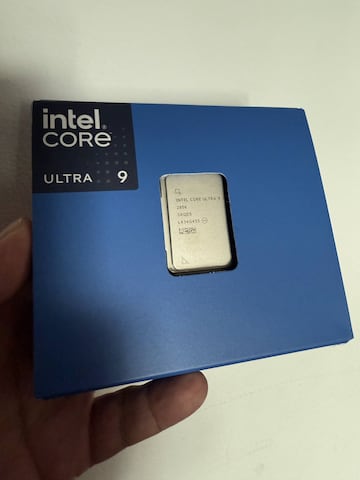Microprocessor
Intel Core Ultra 9 285K: Review of a new generation of -misunderstood?- processors
We examine the performance of the new processor with some video games using our own benchmark.
The new generation of Intel Core Ultra CPUs for desktop PCs is a new era of efficiency and performance, and perhaps it has been completely “misunderstood” to want to compare it with the previous generation. Below, we present the results obtained after several weeks of evaluation of the CPU known by the codename “Arrow Lake.”

Intel Core Ultra 9 285K Specifications
- Number of cores: 24
- Number of performance cores: 8
- Number of efficient cores: 16
- Total Threads: 24
- Maximum Turbo Frequency: 5.7 GHz
- Intel® Thermal Velocity Boost clock speed: 5.7 GHz
- Intel® Turbo Boost Technology 3.0 maximum frequency: 5.6 GHz
- Power Core Max Turbo Frequency: 5.5 GHz
- Efficiency Core Max Turbo Frequency: 4.6 GHz
- Performance core base frequency: 3.7 GHz
- Efficient core base frequency: 3.2 GHz
- Cache: 36MB Intel Smart Cache
- Total L2 Cache: 40MB
- Base Processor Power: 125W
- Maximum turbo performance: 250W
- Intel Deep Learning Boost (Intel® DL Boost) Yes
- Maximum memory size (depending on memory type) 192 GB
- Memory Types: DDR5 6400 MT/s
- Maximum memory speed: 6400 MHz
- Maximum memory channels: 2
- ECC memory support: Yes
- GPU: Intel Graphics
- Graphics base frequency: 300 MHz
- Maximum dynamic graphics frequency: 2GHz
- Maximum GPU TOPS (Int8): 8
- Socket support: FCLGA1851
Configuration of the PC with which we analyzed the Intel Core Ultra 9 285K
- RAM: 48 GB Kingston Fury Renegade at 8400 Mt/s
- Graphics Card: TUF Gaming GeForce RTX 4070 Ti Super
- Motherboard: TUF GAMING Z890-PRO WIFI
- Cooling: TUF Gaming LC II 240 ARGB
- SSD: Kingstone Fury Renegade PCIe 4.0 NVMe M.2
- Chassis: InWin 904 PLUS
Methodology
This analysis focused on the default values (without overclocking) in games with its own benchmark under the same conditions (1440p resolution) with which we did the analysis of the TUF Gaming GeForce RTX 4070 Ti Super GPU, since it will serve as a reference point, since this was done with the Intel Core i9-14900K processor.
Assassin’s Creed Mirage: 170 FPS (+17.6% over Intel Core i9-14900K)

Cyberpunk 2077: 104 FPS (+2% compared to Intel Core i9-14900K)

FarCry 6: 124 FPS (tied with Intel Core i9-14900K)

Returnal: 135 FPS (+47% compared to Intel Core i9-14900K)

Shadow of the Tomb Raider: 204 FPS (+17% compared to Intel Core i9-14900K)

The Callisto Protocol: 91 FPS (same as Intel Core i9-14900K)

As the analysis data shows, the difference is very subtle, less than 17%, although in cases such as Returnal it gave up to 47% more FPS and in games such as FarCry 6 and The Callisto Protocol it gave us exactly the same performance as the Intel Core i9-14900K, although here we must take into account that this processor has a lower power consumption while maintaining a temperature below 109.4 °F with the liquid cooling system at maximum.
Stability
It is important to note that the evaluation was performed with the 1206 version of the TUF GAMING Z890-PRO WIFI motherboard’s Bios, which remained stable during the testing process with the Windows 11 operating system.
Additional benefits
This processor has PCIe 5.0 as standard, DDR5, hardware acceleration for Sony’s new 8K codec and an NPU (Neural Processing Unit). If we want to explore the overclocking section, a robust liquid cooling system should be kept in mind.
The Intel Core Ultra 9 285K is a completely new paradigm in terms of processors with a strong focus on AI and efficient power consumption, all of which translates into better performance and lower temperatures that will ultimately thank our pocket. Although it is important to take into account the investment of the motherboard, since this requires as such a new socket.
Conclusion
The Intel Core Ultra 9 285K is a completely new paradigm in terms of processors with a strong focus on AI and efficient power consumption, all of which translates into better performance and lower temperatures that will ultimately thank our pocket. Although it is important to take into account the investment of the motherboard, since this requires as such a new socket.
Best
- Low power consumption
- Cooling Cooler
- Neural Processing Unit
Worst
- Very similar performance to the previous generation
Score: 8
Follow MeriStation USA on X (formerly known as Twitter). Your video game and entertainment website for all the news, updates, and breaking news from the world of video games, movies, series, manga, and anime. Previews, reviews, interviews, trailers, gameplay, podcasts and more! Follow us now!


